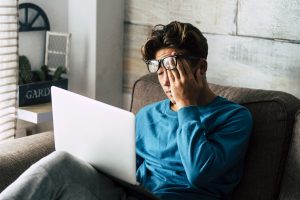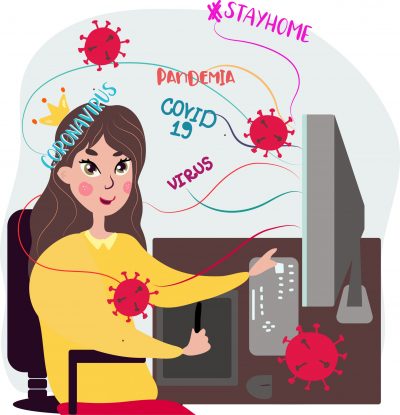Stressed? Tired? Eagerly awaiting the arrival of 2021 and wishing you had an EASY button the size of the Grand Canyon so you could slap it and jump ahead right now?
You’re not alone. Whether you’ve been working from home for the better part of the past year or on the front lines of the pandemic, you’re probably beginning to realize why self-care has been in the news so frequently.
We’re spending far too much time being tied to technology. And by that, I mean sitting in chairs, hunched over keyboards, and tapping on touchscreens. I know. You’re starting to wonder what does this have to do with cybersecurity?
In two words: A lot.

When we spend so much time in front of our computers or using our other digital devices, it becomes easy for us to overlook the simple stuff like installing updates, backing up data, or notifications that software subscriptions have expired. It can also mean we fail to notice the email that just told us we need to reset a password really wasn’t from Amazon, Google, or Facebook. We might click a little too quickly on an invoice.zip attachment in an email…only to realize a split second later that we knew better, but the damage was already done. For those who work as cybersecurity professionals, it could mean missing or dismissing an alert meant to let us know there’s something amiss on a network.
In other words, too much screen time can lull us into complacency and diminish the security of our devices, at home and at work.
Of course, too much screen time can also impact our physical and mental health. There’s no shortage of studies that show staring at a display or sitting for hours can be harmful. Have you ever noticed after staring at a monitor for hours that your eyes are dry, or your vision seems blurry? Or, after sitting in a chair all day for several weeks that your body feels, and may even look, a little different?

The average office worker, pre-COVID, spent about 6.5 hours a day on a computer or nearly 1,700 hours over a year’s time. And, sitting for more than eight hours a day, when combined with no physical activity, has a risk of dying similar to the risks posed by smoking and obesity.
Social media use is also something we need to consider. With the pandemic, social media has kept us connected to our loved ones and our communities. Like so many things in life, though, more isn’t necessarily better. How often we access social media and our reasons for doing so affect us, especially adolescents. One study published in 2019 showed that while routine use is associated with positive health outcomes, emotional connection to social media use is associated with negative health outcomes like being less likely to experience social well-being.
What can we do to counteract the effects of staring, sitting, and FOMO (fear of missing out)?
First, use the 20/20/20 rule when it comes to your eyes. Take regular breaks – every 20 minutes – to look at objects – 20 feet away – for at least 20 seconds. The American Academy of Ophthalmology recommends:
- Blinking more since we tend to blink only five to seven times a minute, rather than the normal 15, when we’re using our devices.
- Adjusting the brightness and contrast of your screen and taking steps to reduce the glare.
- During computer use, making sure your gaze is slightly downward and the screen is about 25 inches away.

Second, get up, stretch, and move around. While I personally can’t see myself positioning a work surface above my treadmill, the suggestions made by Edward R. Laskowski, M.D. at mayoclinic.org are simple. He recommends taking a break every 30 minutes, standing while talking on the phone, and using a standing desk or high table/counter in lieu of sitting at a traditional desk. These small changes can help you burn calories and maintain muscle tone. To counteract the effects of sitting all day, however, more intense physical activity is necessary. (Please always consult your physician first, even if that means virtually!)
Lastly, think about your social media usage. How many social media platforms do you check in with daily? Are you actively staying in touch with your co-workers or loved ones, or just reading others’ posts or the news? Unless you must be connected 24×7 – I realize right now some of us need to be for work or dire personal situations – realize it’s OK to take a break. Go offline for a few hours or even a day (or two).

Your body will thank you, and so will your devices. After a little bit of downtime, your eyes will be less tired you might find yourself sleeping better, and you will probably be ready to tackle installing updates or verifying your backups are working. You might also be less inclined to dismiss a warning message or save yourself (or your workplace) from having to deal with ransomware.
Please know, I recognize the irony. I’m staring and sitting while typing this post, which will be shared via social media. I want to thank you for taking the time (while staring at a screen and probably sitting), and hope you’ll be back to read next week’s post.

